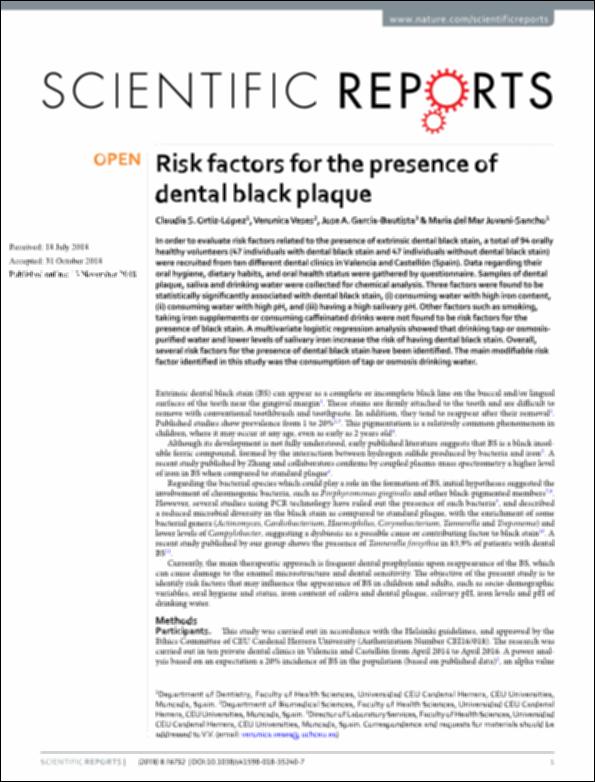Por favor, use este identificador para citar o enlazar este ítem:
http://hdl.handle.net/10637/10503Risk factors for the presence of dental black plaque
| Título : | Risk factors for the presence of dental black plaque |
| Autor : | Ortiz López, Claudia Sara Veses Jiménez, Verónica. García Bautista, José Antonio Jovani Sancho, María del Mar |
| Materias: | Dientes - Bacteriología.; Dental caries - Risk factors.; Caries dental - Factores de riesgo.; Placa dental - Enfermedades - Factores de riesgo.; Mouth - Microbiology.; Dental plaque - Diseases - Risk factors. |
| Editorial : | Springer Nature Publishing AG |
| Citación : | Ortíz López, CS., Veses, V., García Bautista, JA. & Jovani Sancho, MM. (2018). Risk factors for the presence of dental black plaque. Scientific Reports, vol. 8 (november), art. 16752. DOI: https://doi.org/10.1038/s41598-018-35240-7 |
| Resumen : | In order to evaluate risk factors related to the presence of extrinsic dental black stain, a total of 94 orally healthy volunteers (47 individuals with dental black stain and 47 individuals without dental black stain) were recruited from ten different dental clinics in Valencia and Castellón (Spain). Data regarding their oral hygiene, dietary habits, and oral health status were gathered by questionnaire. Samples of dental plaque, saliva and drinking water were collected for chemical analysis. Three factors were found to be statistically significantly associated with dental black stain, (i) consuming water with high iron content, (ii) consuming water with high pH, and (iii) having a high salivary pH. Other factors such as smoking, taking iron supplements or consuming caffeinated drinks were not found to be risk factors for the presence of black stain. A multivariate logistic regression analysis showed that drinking tap or osmosispurified water and lower levels of salivary iron increase the risk of having dental black stain. Overall, several risk factors for the presence of dental black stain have been identified. The main modifiable risk factor identified in this study was the consumption of tap or osmosis drinking water. |
| Descripción : | Este artículo se encuentra disponible en la página web de la revista en la siguiente URL: https://www.nature.com/articles/s41598-018-35240-7 |
| URI : | http://hdl.handle.net/10637/10503 |
| Derechos: | http://creativecommons.org/licenses/by/4.0/deed.es |
| ISSN : | 2045-2322. |
| Fecha de publicación : | 13-nov-2018 |
| Centro : | Universidad Cardenal Herrera-CEU |
| Aparece en las colecciones: | Dpto. Odontología |
Los ítems de DSpace están protegidos por copyright, con todos los derechos reservados, a menos que se indique lo contrario.


